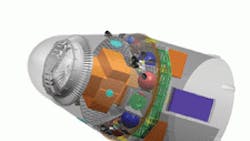Commercial transportation dates back at least several millennia, from the earliest waterborne vessels and rudimentary livestock-pulled wagons. Certainly by the time of Christopher Columbus, the human race had developed vehicles capable of reliably carrying cargo across continents and even hemispheres. While technology has made it possible to deliver larger amounts of goods farther and faster than anybody could have dreamed, all commercial transportation since time immemorial has been limited to terrestrial boundaries. That situation is about to change.
Echoing the famous "Star Trek" idea of space being "the final frontier," NASA has decided to open up the transportation of freight, supplies and even people headed to the International Space Station (ISS) to commercial ventures. Now that NASA has retired its fleet of space shuttles, the space agency intends "to get out of the business of owning and operating low-Earth orbit transportation systems and hand that off to the private sector," according to Charles Bolden, NASA administrator. Bolden emphasizes that it should be U.S. companies and U.S.-built spacecraft that transport U.S. astronauts to the ISS, and not foreign governments.
Dragon spacecraft in cargo configuration. Photo: Spacex
Referring to last year's demonstration flight, Musk points out, "the [Dragon] spacecraft and the Falcon 9 rocket that carried it were designed, manufactured and launched by American workers for an American company." He adds that 2010 marked the first time in more than three decades that U.S. companies began winning back global market share in commercial satellite launches.
Another U.S. company, Orbital Sciences Corp., is working on a pressurized cargo module (PCM) of its own with NASA under the COTS program. Orbital Science's Cygnus cargo logistics spacecraft is scheduled for a demonstration flight to the ISS in early 2012. However, while Orbital Science is a U.S.-based company, the PCM was manufactured and tested in Italy.
About the Author
Dave Blanchard
Senior Director of Content
Focus: Supply Chain
Call: (941) 208-4370
Follow on Twitter @SupplyChainDave
During his career Dave Blanchard has led the editorial management of many of Endeavor Business Media's best-known brands, including IndustryWeek, EHS Today, Material Handling & Logistics, Logistics Today, Supply Chain Technology News, and Business Finance. He also serves as senior content director of the annual Safety Leadership Conference. With over 30 years of B2B media experience, Dave literally wrote the book on supply chain management, Supply Chain Management Best Practices (John Wiley & Sons, 2010), which has been translated into several languages and is currently in its second edition. He is a frequent speaker and moderator at major trade shows and conferences, and has won numerous awards for writing and editing. He is a voting member of the jury of the Logistics Hall of Fame, and is a graduate of Northern Illinois University.
